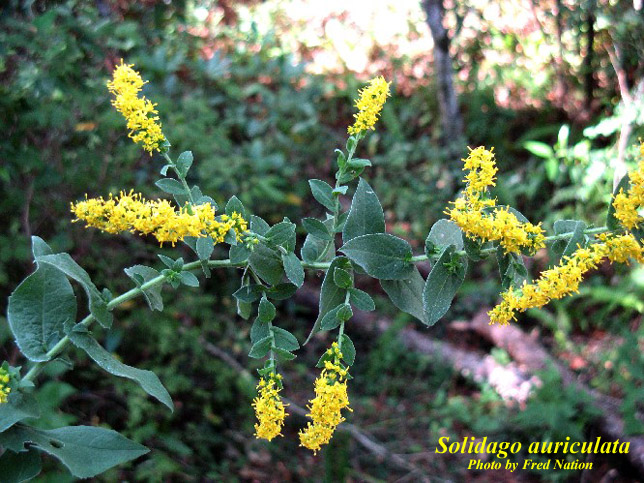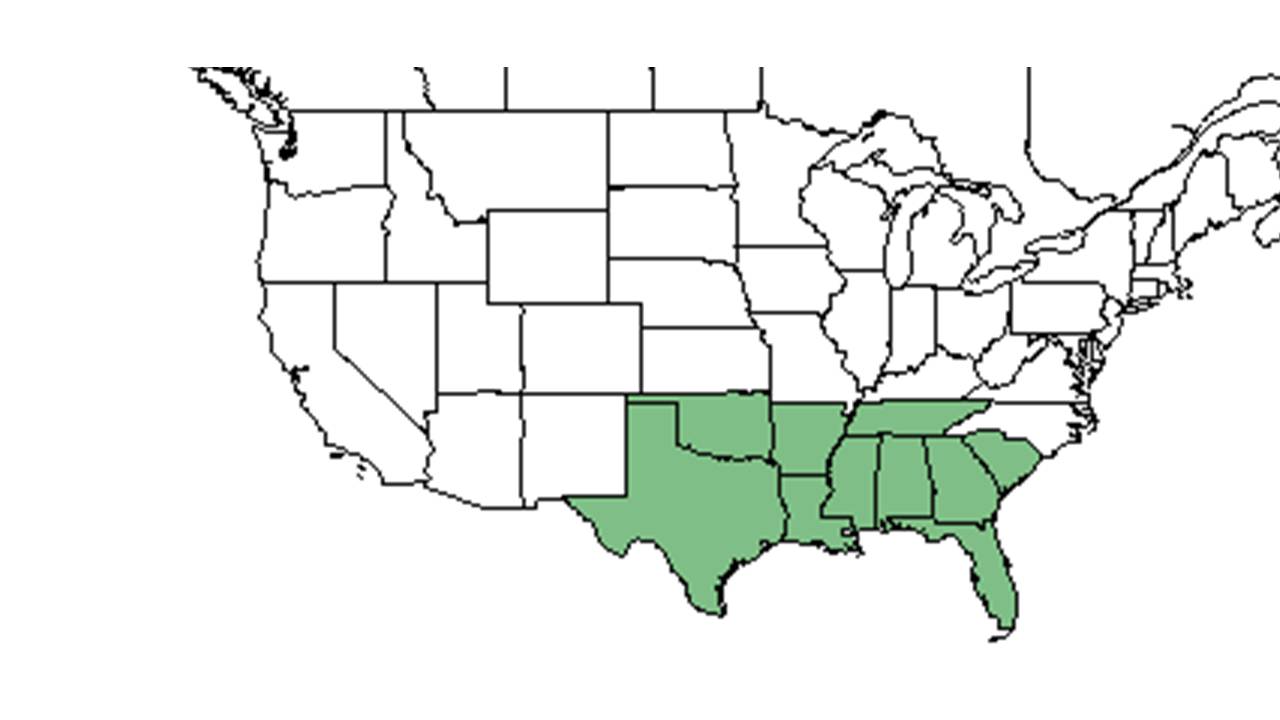Difference between revisions of "Solidago auriculata"
HaleighJoM (talk | contribs) (→Ecology) |
|||
| (7 intermediate revisions by 6 users not shown) | |||
| Line 18: | Line 18: | ||
}} | }} | ||
| − | Common | + | Common names: Eared goldenrod, Clasping-leaf goldenrod |
==Taxonomic notes== | ==Taxonomic notes== | ||
Synonym: ''Solidago notabilis'' Mackenzie | Synonym: ''Solidago notabilis'' Mackenzie | ||
| Line 29: | Line 29: | ||
==Ecology== | ==Ecology== | ||
===Habitat=== <!--Natural communities, human disturbed habitats, topography, hydrology, soils, light, fire regime requirements for removal of competition, etc.--> | ===Habitat=== <!--Natural communities, human disturbed habitats, topography, hydrology, soils, light, fire regime requirements for removal of competition, etc.--> | ||
| − | In the Coastal Plain in Florida, ''S. auriculata'' can be found in limestone glades, limestone outcrops, limestone woodlands, in between limestone glades, mixed hardwood forests and oak-hickory woodlands. <ref name="FSU Herbarium">Florida State University Robert K. Godfrey Herbarium database. URL: [http://herbarium.bio.fsu.edu http://herbarium.bio.fsu.edu]. Last accessed: July 2015. Collectors: Loran C. Anderson, Robert K. Godfrey, Angus Gholson, R. F. Thorne, R. A. Davidson, R. Kral, Ann F. Johnson, Wilson Baker. States and Counties: Florida: Gadsden, Jackson. Compiled by Tall Timbers Research Station and Land Conservancy.</ref> Substrates include dry loam, sandy loam, and calcareous areas. <ref name="FSU Herbarium"/> Associated species include ''Quercus, Carya, Schoenus nigricans, Aristida longespica, Houstonia nigricans, Rhynchospora divergens, Scleria verticillata,'' and ''Juniperus.'' <ref name="FSU Herbarium"/> | + | In the Coastal Plain in Florida, ''S. auriculata'' can be found in limestone glades, limestone outcrops, limestone woodlands, in between limestone glades, mixed hardwood forests and oak-hickory woodlands.<ref name="FSU Herbarium">Florida State University Robert K. Godfrey Herbarium database. URL: [http://herbarium.bio.fsu.edu http://herbarium.bio.fsu.edu]. Last accessed: July 2015. Collectors: Loran C. Anderson, Robert K. Godfrey, Angus Gholson, R. F. Thorne, R. A. Davidson, R. Kral, Ann F. Johnson, Wilson Baker. States and Counties: Florida: Gadsden, Jackson. Compiled by Tall Timbers Research Station and Land Conservancy.</ref> Substrates include dry loam, sandy loam, and calcareous areas.<ref name="FSU Herbarium"/> |
| + | |||
| + | Associated species include ''Quercus, Carya, Schoenus nigricans, Aristida longespica, Houstonia nigricans, Rhynchospora divergens, Scleria verticillata,'' and ''Juniperus.''<ref name="FSU Herbarium"/> | ||
===Phenology=== <!--Timing off flowering, fruiting, seed dispersal, and environmental triggers. Cite PanFlora website if appropriate: http://www.gilnelson.com/PanFlora/ --> | ===Phenology=== <!--Timing off flowering, fruiting, seed dispersal, and environmental triggers. Cite PanFlora website if appropriate: http://www.gilnelson.com/PanFlora/ --> | ||
| − | + | ''S. auriculata'' has been observed to flower in May and August through November and fruit August through November.<ref name="FSU Herbarium"/><ref>Nelson, G. [http://www.gilnelson.com/ PanFlora]: Plant data for the eastern United States with emphasis on the Southeastern Coastal Plains, Florida, and the Florida Panhandle. www.gilnelson.com/PanFlora/ Accessed: 14 DEC 2016</ref> | |
<!--===Seed dispersal===--> | <!--===Seed dispersal===--> | ||
<!--===Seed bank and germination===--> | <!--===Seed bank and germination===--> | ||
<!--===Fire ecology===--> <!--Fire tolerance, fire dependence, adaptive fire responses--> | <!--===Fire ecology===--> <!--Fire tolerance, fire dependence, adaptive fire responses--> | ||
| − | <!--===Pollination===--> | + | <!--===Pollination===--> |
| − | <!--=== | + | <!--===Herbivory and toxicology===<!--Common herbivores, granivory, insect hosting, poisonous chemicals, allelopathy, etc--> |
<!--===Diseases and parasites===--> | <!--===Diseases and parasites===--> | ||
| − | ==Conservation and | + | |
| − | == | + | ==Conservation, cultivation, and restoration== |
| + | |||
| + | ==Cultural use== | ||
| + | |||
==Photo Gallery== | ==Photo Gallery== | ||
<gallery widths=180px> | <gallery widths=180px> | ||
</gallery> | </gallery> | ||
==References and notes== | ==References and notes== | ||
Latest revision as of 17:17, 15 July 2022
| Solidago auriculata | |
|---|---|

| |
| Photo by Fred Nation, Atlas of Florida Vascular Plants | |
| Scientific classification | |
| Kingdom: | Plantae |
| Division: | Magnoliophyta – Flowering plants |
| Class: | Magnoliopsida – Dicotyledons |
| Order: | Asterales |
| Family: | Asteraceae ⁄ Compositae |
| Genus: | Solidago |
| Species: | S. auriculata |
| Binomial name | |
| Solidago auriculata Shuttlw. ex S.F. Blake | |

| |
| Natural range of Solidago auriculata from USDA NRCS Plants Database. | |
Common names: Eared goldenrod, Clasping-leaf goldenrod
Contents
Taxonomic notes
Synonym: Solidago notabilis Mackenzie
Description
A description of Solidago auriculata is provided in The Flora of North America.
Distribution
Ecology
Habitat
In the Coastal Plain in Florida, S. auriculata can be found in limestone glades, limestone outcrops, limestone woodlands, in between limestone glades, mixed hardwood forests and oak-hickory woodlands.[1] Substrates include dry loam, sandy loam, and calcareous areas.[1]
Associated species include Quercus, Carya, Schoenus nigricans, Aristida longespica, Houstonia nigricans, Rhynchospora divergens, Scleria verticillata, and Juniperus.[1]
Phenology
S. auriculata has been observed to flower in May and August through November and fruit August through November.[1][2]
Conservation, cultivation, and restoration
Cultural use
Photo Gallery
References and notes
- ↑ 1.0 1.1 1.2 1.3 Florida State University Robert K. Godfrey Herbarium database. URL: http://herbarium.bio.fsu.edu. Last accessed: July 2015. Collectors: Loran C. Anderson, Robert K. Godfrey, Angus Gholson, R. F. Thorne, R. A. Davidson, R. Kral, Ann F. Johnson, Wilson Baker. States and Counties: Florida: Gadsden, Jackson. Compiled by Tall Timbers Research Station and Land Conservancy.
- ↑ Nelson, G. PanFlora: Plant data for the eastern United States with emphasis on the Southeastern Coastal Plains, Florida, and the Florida Panhandle. www.gilnelson.com/PanFlora/ Accessed: 14 DEC 2016